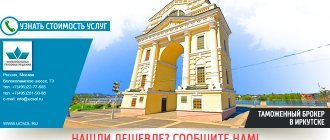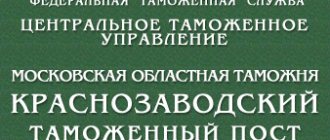Express analysis
100%
The company's rating is very high
+1403 points for positive factors
0 points for negative factors
Positive factors
- Long working time
The company was registered 32 years ago, which indicates stable activity and supervision by government agencies.
- Licenses available
The company has received several licenses, which is a sign of the high reliability of the counterparty.
- Participant in the public procurement system
The company is an official participant in the public procurement system under 44-FZ.
- Contracts as a customer
Signed several contracts under 94-FZ, 44-FZ or 223-FZ as a customer.
- Contracts as a performer
Signed several contracts under 94-FZ, 44-FZ or 223-FZ as a contractor (supplier of goods or services).
- Not included in the register of unscrupulous suppliers
According to the FAS, it is not included in the register of unscrupulous suppliers.
- No connections to disqualified persons
According to the Federal Tax Service, the company’s executive bodies do not include disqualified persons.
- There are no mass leaders and founders
The leaders and founders of SARATOV CUSTOMS are not included in the registers of mass leaders and mass founders of the Federal Tax Service.
- No debts due to enforcement proceedings
According to the FSSP, there are no open enforcement proceedings against the company.
Negative factors
Not detected
Requisites
| OGRN | 1036405207046 |
| TIN | 6452016790 |
| checkpoint | 645201001 |
| Code KLADR | 640000010000078 |
| OPF code | 75104 (Federal government agencies) |
| OKTMO code | 63701000 |
| SDR code | 01601000067 |
| ICU | 16452016790645201001 |
See also information about registration of SARATOV CUSTOMS with the Federal Tax Service, Pension Fund and Social Insurance Fund
International transportation to Saratov (from Saratov)
Our company “Universal Cargo Solutions” provides services for international cargo transportation to Saratov. We transport any cargo and goods to Saratov, or, conversely, from Saratov to any country in the world.
We use different types of transport:
- Automotive (truck)
- Railway (container)
- Aviation (air)
- Multimodal (combined)
We provide international delivery to Saratov of cargo of any volume, size and type from any country in the world (Asian countries: China, Vietnam, India; CIS: Kazakhstan, Kyrgyzstan, Belarus, Ukraine; Europe: Poland, Germany; as well as the USA and many other countries ). We also carry out international delivery of goods to any region and city of the Russian Federation: Novosibirsk, Sevastopol, Rostov-on-Don, Voronezh, St. Petersburg, Moscow and many others.
Our specialists provide professional transportation (transportation and delivery) of all types of cargo from Saratov and to Saratov:
- General
- Prefabricated
- Perishable
- Dangerous
- Container
- Bulk
- Oversized
- Oversized
- Heavyweight
- Live animals
- And others
Saratov is a large city, one of the most important transport hubs in the Volga region. Saratov is a commercial and cultural center of Russia, has its own rich history and has the unofficial status of “Capital of the Volga Region”. Saratov is located on the banks of the Volgograd Reservoir approximately equidistant from Volgograd and Samara, 858 km southeast of Moscow. There are federal highways M5, M6, P228, A144, P158 with directions to Syzran, Volgograd, Ural, Moscow, Astrakhan, St. Petersburg. And there is also a large railway junction with 11 railway stations, four of which are freight only. There is a Saratov-Port railway station adjacent to the Saratov port on the Volga. There is an airport with international status. Construction of a new airport outside the city is underway. We can safely say that important transport routes to Europe and Asia pass through Saratov.
Contacts
| Address | 410010, Saratov region, Saratov, st. Artilleriyskaya, 7 On the map |
| Phones | +7,, |
| Fax | +7 |
| [email protected] | |
| Web site | ptu.customs.ivs |
| Is your contact information out of date? If you are related to SARATOV CUSTOMS and know the exact contact details of this company, please share them. Edit contacts | |
Customs broker services
- Personal customs clearance specialist;
- We prepare and execute the necessary documentation - declarations, applications, various permitting forms, documents, reporting;
- Recommendations on HS codes for goods;
- Preliminary calculation of customs value and amount of advance customs payments;
- Drawing up DT projects and related documents;
- Document flow with customs;
- Submission of information at the request of Saratov customs;
- Representation of the Customer's interests in the customs authorities of the Russian Federation;
- Organization, if necessary, of preliminary customs inspection of goods and vehicles before submitting the DT;
- Drawing up a declaration of intent under the seal of the customs representative;
- Consulting in the field of foreign economic activity (FEA);
Types of economic activities
Main activity
| 84.11.4 | Financial and tax management |
Licenses
1. License No. AN 64-000003 dated March 18, 2019
Kind of activity
Activities for transporting passengers and other persons by buses
Licensing authority
Territorial department of state road supervision for the Saratov region
2. License No. 13.01.04.002.L.000002.05.18 dated May 25, 2021
Kind of activity
Activities in the field of use of ionizing radiation sources (generating) (except for the case if these sources are used in medical activities)
Licensing authority
Office of the Federal Service for Supervision of Consumer Rights Protection and Human Welfare for the Republic of Mordovia
3. License No. 77.99.15.002.L.000005.01.08 dated January 16, 2008
Kind of activity
Activities in the field of use of ionizing radiation sources (generating) (except for the case if these sources are used in medical activities)
Licensing authority
Federal Service for Supervision of Consumer Rights Protection and Human Welfare
… Show all licenses (4)
Chapter 3. Saratov customs
While the process of creating customs inside the country was underway, declarants-intermediaries at the border were still involved in declarations. With this system, cargo control remained as formal as before. And for transport organizations, the main thing was to deliver the cargo to its destination without costly downtime. When internal customs gradually began to be involved in the work of processing cargo, the recipient and sender of the cargo could choose the option of declaring it at the border or at the local customs office. For some time, there was a kind of “dual power” in the customs control system until internal customs became stronger.
The government decree was only a fundamental document, and a “locomotive” was needed locally to push the provisions of the document into practice. It was necessary to break the established traditions of transport organizations in the technology of transporting foreign trade goods, primarily the railways, as the largest carrier. The railway is a state within a state, and railway workers are people in general
very conservative, they have preserved the names of stations from time immemorial, long-forgotten concepts like “okolok” are in use. Many workers, especially at peripheral stations, stubbornly refused to understand that the customs border could move from the state border line to the place of receipt or dispatch of cargo. They did not want to hear anything about the government decree on this issue; in their work they were guided exclusively by teams from the Road Administration and departments. To begin with, I had to prepare a draft order on the procedure for sending and issuing foreign trade cargo and approve this document together with the management of the Volga Railway. Paper is paper, but in practice it took some time to patiently explain the provisions of this order to railway workers on the ground, warn, and then fine violators.
The process of establishing customs was very difficult. Knowledgeable people warned me in advance that Saratov is a special city, a merchant city, and not everyone here can survive and achieve success. Indeed, I had to experience all this on myself to the fullest. Nobody in the regional party committee was going to provide me with the help that was promised to me earlier. Customs issues were the responsibility of the first deputy chairman of the regional executive committee, Razzhigaev, and after my next appeal regarding the allocation of premises for customs, Razzhigaev could not stand it.
-Why do you keep coming to me? - he said irritably, - go to those who need your customs, to the directors of factories, for example, to those who are engaged in trade with foreign countries. I could solve this issue, but I don’t have time for this, and why do I need it?
The City Executive Committee adopted a resolution to allocate several rooms to the customs organization, which was located in a residential building near the embankment. The organization built itself a separate building and moved into it, but when we came to occupy the allocated area with the resolution and reconstruction plan prepared by SEPO, the door there was barricaded, and some people announced that these premises belonged to their organization and there would be apartments here workers. The city authorities just shrugged their shoulders in response to my bewildered question.
It seemed that, against the backdrop of the formation of numerous cooperatives, I was busy trying to understand officials for myself personally, and not dealing with the affairs of an important public service. In Engels, at a reception with the chairman of the city executive committee on the issue of creating a customs post, the official did not hesitate to ask me directly:
-What will I get for this?
“Personally, it’s okay,” I answered, “only it will be much easier for enterprises and organizations in the city to enter the foreign market.”
When I dreamed of finding help or at least advice in the then all-powerful regional party committee of Anfinogentov, who, as I was told, was in charge of foreign trade issues, his assistant, after consultations with the boss, simply refused to make an appointment for me. Apparently, from the height of such a party post, the issue of exports and imports in the region looked too small. Then let me ask, what issues did you, great party leaders, solve? How many cards should I print to buy groceries, and what color should the paper be? Here is one of the brightest moments of the degradation of the party leadership. Of course, you can reproach me that I was also in the party. But I was just spinning around, hitting my forehead against the wall of the party and Soviet bureaucracy, trying to break through it in every possible and impossible way.
It became clear to me that if I personally did not resolve the issue with the customs premises, no one would deal with it. I began to probe this issue in organizations and enterprises that were engaged in foreign trade activities. The chemical enterprise Nitron responded, which was ready to allocate a couple of rooms for customs, but geographically this would not suit anyone except the enterprise itself; it would be too far to get to it. The director of the Shopping Center Chernyshuk proposed to equip several offices in one of the pavilions, but I was afraid that
novice inspectors will often leave their jobs in search of tempting shortages, and may even merge with the trade organization in foreign economic ecstasy, as the Russian prime minister once put it.
It’s not for nothing that they say that there is nothing more permanent than temporary solutions. In the house on Chelyuskintsev Street, 101, we, as befits heroes of the North, fought for survival for a long time. Saratov customs was born here. The main thing at that stage was to train the nine people already hired in customs. It should be noted that all employees got down to business with enthusiasm and carefully studied the declaration materials. The science is quite complex; knowledge was needed on a very wide range of issues of customs clearance of goods. If we compare working with individuals crossing the border with the skill of riding a bicycle, then working with cargo has now begun to resemble the skill of driving a modern car in a big city.
All employees were listed as inspectors according to the staffing table, and it was also necessary to divide among them the additional workload of an accountant, cashier, personnel officer and typist. Accounts were immediately opened in the State Bank, salaries began to be calculated and the necessary financial transactions were carried out. Just like Santa Claus, I brought by train from Moscow several boxes with cut-offs for uniforms, a typewriter, two telephones and office supplies. Everything was very modest, but the process had already begun.
Declaration of goods was the responsibility of importers and exporters; customs only verified the accuracy of the data in the declarations. To draw up a declaration, special preparation and various reference books were needed, so such work was most often carried out on a contractual basis by intermediary declarants. The local branch of the Chamber of Commerce and Industry, hoping to make good money, volunteered to handle the declaration, and two more girls appeared in our room with a typewriter. We took them in for free to train them in a new business; it was a bit crowded, but the training process together with the inspectors was intensive.
On October 18, 1989, customs began clearing cargo - on this day the first declaration was stamped. Only two months have passed since my arrival in Saratov, and then customs made itself known. By the end of the year, about 140 cargo declarations were completed. The work had just begun, but already in November the KRU commission of the regional executive committee came to the customs office with an inspection. Our service did not replenish the regional treasury; all payments had to be transferred to the union budget, so the interest in customs was not entirely clear. It would be much more useful at the formation stage to have at least a little help and support from the regional authorities.
Copies of declarations were also transferred to the regional statistical office, where
they were processed on computer technology, sometimes errors were found there, and some employee called me on the phone and made comments in an important tone - after all, we worked then without computers, manually. After some time, the State Customs Committee began to independently generate customs statistics and transfer them to the government. Nevertheless, the statistical office insisted on receiving copies of declarations from us, and I had to politely advise that these issues be resolved at the Moscow level.
The heads of some enterprises were sympathetic to the needs of customs during its formation. If the help was not linked to any conditions, I sometimes used this “non-statutory” factor. Indeed, in times of total shortage, even with the availability of funds, it was difficult to “get” furniture and equipment. Through the enterprises we purchased decent tables and chairs, a German typewriter, and a fax machine by bank transfer. They brought us two safes from Balakovo at a very reasonable price. True, the safes had no keys, but a solution was found. The thought occurred to me that the State Bank could at least give advice on this matter, and indeed, with reservations, they gave me the telephone number of a safe specialist. Surprisingly, the man agreed to help and literally in a couple of minutes, using special master keys, opened both safes. There were spare sets of keys inside, and the problem of safety of valuables and documents was solved.
Employees continued to master the work of checking cargo declarations, and the geography of customs control began to expand to remote areas of the region. In 1990, about two thousand cargo declarations were already completed. We have also established inspections of containers with household items of military personnel arriving from Germany. A large number of citizens began to contact customs with questions about sending household items when traveling abroad for permanent residence. We did not have any conditions for such work and, following Razzhigaev’s advice, I jokingly suggested that the walkers themselves set up an inspection room in the warehouse at the Saratov-2 station, since the railway flatly refused to deal with this issue. To my surprise, some construction team got to work, and in a short time we had an inspection room and a storage area for checked items at our disposal. The work began, cases of smuggling began to be opened, things and valuables were seized. Saratov television journalist Oleg Shommer, who was later sent to work in Paris, even launched a program on Central Television about our customs.
In July 1990, an employee of the local newspaper “Kommunist” arrived at the customs office to consider the complaint of citizen Titievskaya, who wrote the following to the regional party committee and the newspaper: “I appeal to you with a request: look at those who decided to leave the Soviet Union, at the humiliation suffered to their share when checking in luggage at Saratov II station. Is it possible to install a device there like a TV, which is at the airport? Just not to see how every rag is shaken, bringing luggage check-ins to a pre-heart attack state. Who gave the right to humiliate those leaving the Union?”
We conducted an internal investigation. Citizen Titievskaya was not included in the lists of persons undergoing customs clearance; perhaps she was one of the mourners. It’s not our fault that we had nothing to brag about in terms of equipment. The norms for the export of things were not set by customs, but the law - “dura” (in Russian it sounds more decent than in Latin), and it must be followed, however, luggage inspection could only be carried out in our conditions manually, sponsors did not talk about “TVs” taken care of. The regional party committee and other authorities helped the customs only by “reacting” to the complaint received in their usual style. What would an indignant citizen say if her loved ones had to take their luggage for inspection, for example, to the well-equipped Moscow customs office, and also sign up for a queue six months in advance? So I had something to say in another extensive interview with the newspaper, of course, except criticism of the party.
The year 1991 brought a lot of changes to the life of the country, which also affected customs. In January, without much effort, I got an appointment with the first secretary of the city party committee, with whom I wanted to discuss my biggest and still unresolved problem - the allocation of premises for customs. The former chairman of the regional executive committee, Grishin, also sat in the party boss’s office; they listened to me attentively, sympathized with my difficulties, treated me to coffee, and that was the end of my last visit to the party leadership. It was clear to the naked eye that the party no longer solved anything, and its leadership served only as decoration for luxurious offices, compared to customs. What can I say if in the primary party organization of the regional executive committee, where I was registered, since February the majority of communists stopped paying membership fees.
Without party influence and ideological leadership, our official issues began to be resolved much more successfully. The first car appeared at customs, a minibus, which we ordered through a battery factory that received cars through barter from Romania. The minibus was inexpensive, so the money was transferred from Moscow without delay. Externally, the miracle of the Romanian automobile industry looked very presentable: original body coloring, high seating position, two drive axles. But when the bus was started, it began to vibrate, chug, release clouds of dark diesel smoke and jerk forward. It looked very similar to the steamboat in the cartoon "Boniface's Vacation", I nicknamed the car Boniface, and the nickname stuck. There was no power steering, and the small driver had difficulty turning the large steering wheel; after each trip he complained that his hands hurt. But still, it was already our own transport, without which we suffered for the first year and a half.
The issue of customs premises has also moved forward. Persistent searches led me to the director of the metal structures and theater equipment plant. He offered us to rent part of the second floor of the administrative building of the plant with a separate entrance from the street. Many businesses at that time were not doing well, and renting out premises made it possible to obtain additional funds for survival. True, the room was bare and empty, long, like a barn, both in form and content. It was advantageous that the building was located in the central part of the city, in a place very convenient in terms of transport.
There was no money to equip the premises; to allocate the necessary funds, it was necessary to draw up and approve cost estimates in Moscow in advance, and this would have required another whole year. Yes, they might not have allocated anything for such a temporary solution to the problem, but it was necessary to work now, there were already two dozen employees at the customs. We divided our “shed” in the drawing into seven offices, and I began to ask the directors of the enterprises to help with building materials and labor. Things went quite quickly, partitions were built, doors were installed and the finishing work began, only before they were completed we had to urgently move from the premises along Chelyuskintsev Street.
With all the organizational and construction efforts, I relaxed control over the work of checking the luggage of citizens traveling to Israel. The luggage was rechecked at the border at the Izmail and Reni customs offices, I don’t know for what reason, maybe the customs were not busy enough or they wanted to raise their prestige, or most likely, there was such an arrangement from above. One way or another, the Customs Committee began to receive written information, and our customs began to receive copies of letters about the identification of
re-examination of smuggled items in luggage from Saratov, and in quite large quantities. These were mainly items made of precious metals and currency hidden in things.
This information greatly alarmed me, and when I was in Moscow on a business trip, I, on my own initiative, met with the head of the Anti-Smuggling Department and assured him that I would immediately restore order at the baggage check area. It was clear that if I didn’t do this myself, then someone else would put everything back to normal, but without me as the boss.
By comparing the information received with the log of inspected luggage and declarations of the owners, it was not difficult to determine the circle of people who, through negligence or by agreement with controlled persons, allowed items and valuables prohibited for export abroad. Bringing specific culprits to justice was complicated by the fact that the “old men” who had already appeared in a short time offered to put personal stamps on documents for young employees. At an emergency meeting, I warned the employees in the strictest possible manner about their personal responsibility for the quality of inspection work and explained that violation of established standards and inspection technology is subject to punishment, including criminal prosecution in accordance with current legislation.
After inspecting the next batch of boxes with things that were accumulated in an isolated room of the warehouse and stored until loading into wagons behind a customs seal, I gave the task to a team of inspectors specially selected by me to re-inspect all the boxes that had already been checked. As a result of the rather labor-intensive work carried out, items made of precious metals, currency and a painting without an export permit from the Ministry of Culture were found in one of the boxes, not declared in customs declarations and hidden from control. The preliminary assessment of the currency and valuables amounted to 9,950 rubles, and with the addition of the cost of the painting it could exceed 10 thousand rubles, which, according to the current Customs Code of the USSR, was classified as smuggling, punishable by criminal law.
It was not difficult to determine that the customs clearance was carried out by Senior Inspector V.; his personal numbered stamp was affixed to the accompanying documents and declaration. An investigation into the circumstances of the inspection of things revealed that this customs officer, at the request of the owners of the luggage, arbitrarily took the keys to the warehouse at the customs office and on a day off allowed these citizens to open one of the sealed boxes and place there some allegedly forgotten things, which contained contraband items. At that time, the customs officer himself stood aside on the platform and calmly smoked, and when the stash was made, he sealed the box and the room.
Frankly, I found myself in a very delicate situation. When investigating the case, the investigative authorities would inevitably reveal the senior inspector's complicity in an attempt to smuggle valuables across the state border, and given the fact that this was not the first time he had done this, the customs officer would have faced time. I didn’t really need such a scandal at the very beginning of the customs work, and I decided to let things go on the brakes. The painting was valued at the minimum amount so as not to reach the critical mark of ten thousand rubles, and the case was considered by customs as administratively punishable without being referred to the investigative authorities.
I explained to the unfortunate customs officer what kind of situation he had created with his, to put it mildly, strange actions, what punishment he could suffer, and invited him to quietly leave of his own free will. I don’t know what was in the thoughts of the senior inspector, but he assured me that he understood everything, wrote a statement and even expressed gratitude for this outcome of the case. He was a man with a good track record, served in the Kremlin regiment, then as an ensign in the KGB, and could not help but understand what is good and what is bad. In addition to purely moral conventions, there were for unconditional guidance and execution
job descriptions and approved customs control technology. The reason for the criminal actions of the customs officer, obviously, lay in his addiction to alcoholic beverages and an incomprehensible belief in impunity.
However, although I saved the irresponsible employee from big troubles, no one from his close circle wanted to appreciate it. Moreover, I even became an enemy of the former chief inspector's family. The customs officer’s wife, a very influential lady in the city, began asking me over the phone not to fire my husband. She didn’t even want to listen to all my explanations that the option of leaving work of her own free will was simply God’s grace, and when she realized that persuasion would not help, she moved on to action. To begin with, an excuse was found to break the rental agreement for the premises.
Knowledgeable people told me that it was in vain that I did not meet this lady halfway, she is a very influential person and does not forgive anyone anything, and besides, her son-in-law serves in the authorities. But I believed that I acted very mildly, and did not want to compromise my principles in front of people who see only punishment, not at all commensurate with the severity of the offense, or without noticing it at all, probably accustomed to impunity and connivance, considering themselves out of reach from any persecution. Everyone at customs knew about the baggage incident, and if such a flagrant violation had been forgiven for one person, it would have created an atmosphere of complete impunity for the rest of the employees.
To ensure the safety of documents and property, I issued an order to approve the night duty schedule, and at the beginning of July 1991 we moved to new premises, fortunately, we had our own transport. At first I had to settle in one office; in the rest, renovations were in full swing, which was completed in stages by the end of the year. As the volume of work grew, the number of staff increased, computers and various office equipment appeared. By the fall, we still managed to receive two RAF minibuses from Riga, which was striving for independence, and two coffee-colored “sixes” from Togliatti. Transport was very useful, as customs posts were created in the cities of Engels and Balakovo.






